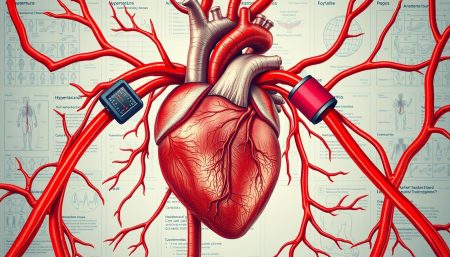Cardiovascular disease affects millions of lives worldwide, raising questions about life expectancy and quality of life. Modern medical advancements have greatly improved the prognosis for cardiovascular disease. Many patients now live longer, fuller lives after diagnosis.
Understanding life expectancy with heart disease is key for patients and their families. Today’s treatments and management strategies offer new hope and better outcomes. From innovative medications to lifestyle modifications, many factors influence how long someone can live with cardiovascular conditions.
This article explores the latest in cardiac care. We’ll look at survival rates, treatment options, and ways to extend and improve life with heart disease. We’ll also discuss the factors that affect prognosis and offer practical advice for those navigating this challenging journey.
Understanding How Long Can You Live With Cardiovascular Disease
Cardiovascular disease affects millions, leading to questions about life expectancy. The impact on longevity varies widely, depending on the type and severity of the condition. Recent medical advancements have significantly improved survival rates for cardiovascular patients, giving hope and extending life spans.
Types of Cardiovascular Disease and Their Impact on Longevity
Different heart conditions affect life expectancy in various ways. Coronary artery disease can reduce life span by 10-15 years if left untreated. Heart failure may shorten life by 5-10 years. Arrhythmias have a wide-ranging impact, from minimal to severe, depending on the specific type and treatment.
Modern Medical Advancements in Heart Disease Treatment
Innovative treatments have changed cardiac care. Minimally invasive procedures, like angioplasty and stenting, restore blood flow with less risk. Advanced medications help manage symptoms and slow disease progression. These developments have dramatically increased how long you can live with cardiovascular disease.
Statistical Overview of Survival Rates
Current statistics paint a hopeful picture for heart disease patients. Five-year survival rates for heart attack survivors have improved to over 75%. For those with heart failure, the five-year survival rate is now around 50%, a significant increase from past decades. These numbers reflect the positive impact of early detection, improved treatments, and better management strategies.
| Condition | 5-Year Survival Rate | Improvement from Past Decades |
|---|---|---|
| Heart Attack | Over 75% | 25% increase |
| Heart Failure | Around 50% | 20% increase |
Key Factors That Influence Life Expectancy with Heart Disease
Living with heart disease is tough. Knowing what affects life expectancy is key to managing heart conditions well. Let’s look at the main factors that shape life expectancy for heart disease patients.
Age at Diagnosis and Its Impact
The age of diagnosis matters a lot. Early detection means better chances for treatment and lifestyle changes. Younger people often have stronger hearts, which can help them live longer with the right care.

Lifestyle Choices and Their Effects
Our daily choices greatly affect our heart health. Smoking, bad diet, and not exercising can make heart disease worse. But, choosing healthy habits like regular exercise, good food, and managing stress can greatly improve life expectancy.
| Lifestyle Factor | Positive Impact | Negative Impact |
|---|---|---|
| Diet | Reduced risk of complications | Increased heart strain |
| Exercise | Improved heart function | Weakened cardiovascular system |
| Stress Management | Lower blood pressure | Higher risk of heart attacks |
Genetic Predisposition Considerations
Genetics can affect when and how heart disease starts. We can’t change our genes, but knowing our family history helps. Regular check-ups and care plans tailored to genetic risks are vital for heart condition management.
“Understanding your genetic risk doesn’t seal your fate. It empowers you to take proactive steps in heart health management.”
Latest Treatment Options and Their Effect on Survival Rates
The world of heart care is changing fast. New treatments are making a big difference in how long people with heart disease can live. These new therapies are leading a medical revolution.

Heart surgeries are now less invasive. Procedures like transcatheter aortic valve replacement (TAVR) help patients who were once too risky for surgery. Studies show 72% of TAVR patients live more than five years after the procedure.
New medicines are also key in saving lives. Drugs made for diabetes are helping heart failure patients. They cut hospital stays and deaths by up to 25% in trials.
Gene therapies are the newest frontier in heart care. They aim to fix heart problems by targeting genetic issues. Early results are encouraging, showing promise for long-term treatments of inherited heart conditions.
| Treatment | 5-Year Survival Rate | Quality of Life Improvement |
|---|---|---|
| TAVR | 72% | Significant |
| SGLT2 Inhibitors | Increased by 25% | Moderate to High |
| Gene Therapy | Data Pending | Potentially Life-Changing |
These new treatments highlight the need to keep up with heart care news. As treatments get better, they bring hope for longer, better lives for heart patients.
Managing Cardiovascular Disease for Extended Life Expectancy
Living with cardiovascular disease long-term needs a strong commitment to health. By focusing on key strategies, patients can greatly improve their heart health and life span.
Medication Adherence Importance
It’s very important to take all prescribed medications as directed. Skipping doses or stopping without a doctor’s okay can cause serious problems. Using pill organizers or apps on your phone can help keep track of your meds.
Regular Medical Monitoring
Regular check-ups and tests are key for managing heart disease. These visits help doctors check your heart health and adjust treatments if needed. A typical monitoring schedule might include:
| Test | Frequency | Purpose |
|---|---|---|
| Blood pressure check | Monthly | Monitor hypertension |
| Cholesterol panel | Every 6 months | Track lipid levels |
| Echocardiogram | Annually | Evaluate heart function |
Lifestyle Modifications for Better Outcomes
Adopting heart-healthy habits is key for a longer life with heart disease. Important lifestyle changes include:
- Following a balanced, low-sodium diet
- Engaging in regular, doctor-approved exercise
- Quitting smoking and limiting alcohol intake
- Managing stress through relaxation techniques

By sticking to your meds, getting regular check-ups, and making healthy lifestyle choices, you can manage your heart disease well. This can help you live a longer life.
The Role of Early Detection in Long-Term Survival

Early detection is key in fighting cardiovascular disease. Spotting warning signs early and getting medical help fast can greatly improve survival chances. Regular health checks and screenings help find heart problems before they get serious.
Tests like blood pressure checks, cholesterol tests, and electrocardiograms can spot issues early. This leads to quicker treatments, which can greatly improve life expectancy.
“Catching heart disease in its early stages can add years to a patient’s life. It’s not just about survival; it’s about maintaining quality of life,” says Dr. Sarah Johnson, a leading cardiologist.
The benefits of early detection on survival are huge. Here’s some data to show why:
| Stage of Detection | 5-Year Survival Rate | Quality of Life Score |
|---|---|---|
| Early Stage | 90% | 8.5/10 |
| Advanced Stage | 50% | 5.5/10 |
Early treatment often means less invasive procedures. This reduces complications and boosts patient outcomes. By focusing on early detection, we can greatly improve survival rates and quality of life for heart disease patients.
Impact of Different Heart Conditions on Life Duration
Knowing how long you can live with heart disease depends on the condition. Life expectancy varies with the type and severity of heart disease. Let’s look at three common heart conditions and their effects on life span.

Coronary Artery Disease Prognosis
Coronary artery disease (CAD) is a major cause of heart-related deaths. Yet, with proper care, many CAD patients live long, fulfilling lives. The 5-year survival rate for CAD patients is about 70%.
Lifestyle changes, medications, and procedures like angioplasty can greatly improve outcomes.
Heart Failure Life Expectancy
Heart failure makes it hard for the heart to pump blood. Despite its seriousness, better treatments have raised survival rates. The average life expectancy after diagnosis is 5 to 10 years.
This depends on the heart failure stage and how well you follow treatment plans.
Arrhythmia Long-Term Outlook
Arrhythmias, or irregular heartbeats, can vary in severity and impact on life span. Some are harmless, while others are life-threatening. With the right treatment, many people with arrhythmias can live a normal life.
Medications, lifestyle changes, and devices like pacemakers can manage symptoms and lower risks.
| Heart Condition | 5-Year Survival Rate | Key Factors Affecting Prognosis |
|---|---|---|
| Coronary Artery Disease | 70% | Lifestyle changes, medication adherence |
| Heart Failure | 50% | Stage at diagnosis, treatment compliance |
| Arrhythmia | 85% | Type of arrhythmia, underlying causes |
These figures are averages. Your life expectancy with heart disease can vary based on your overall health, age, and treatment commitment. Regular check-ups and following your doctor’s advice are key to managing heart conditions and living longer.
Quality of Life Considerations for Heart Disease Patients
Living with heart disease is more than just surviving. It’s about enjoying life despite health issues. People with chronic heart conditions can stay active and independent with the right approach.
Managing symptoms is key to a better life. Patients can work with their doctors to control pain, fatigue, and other symptoms. This might include changing medications, making lifestyle changes, and finding ways to reduce stress.
Keeping independence is also important. Using adaptive devices and making home changes can help with daily tasks. For example, shower chairs, grab bars, and easy-to-use kitchen tools are helpful.
Staying connected with others is vital. Support groups let patients share experiences and tips with others facing similar issues. Family and friends can offer emotional support and help with daily tasks.
“Focus on what you can do, not what you can’t. Every day is an opportunity to live life to the fullest.”
Doing things you enjoy is good for your mind. Patients can find hobbies or interests that fit their physical abilities. This could be low-impact exercises, art, or volunteering.
| Quality of Life Aspect | Strategies for Improvement |
|---|---|
| Symptom Management | Personalized treatment plans, medication adherence |
| Independence | Adaptive devices, home modifications |
| Social Connections | Support groups, family involvement |
| Mental Well-being | Adapted hobbies, stress reduction techniques |
By focusing on these areas, patients can improve their quality of life. Remember, living a long life is not just about longevity. It’s about enjoying life with heart disease too.
Prevention Strategies to Extend Life with Heart Disease
Living with heart disease doesn’t mean you can’t have a long, happy life. By using key prevention strategies, you can greatly improve your heart health. Let’s look at simple ways to boost your heart well-being and tackle heart disease’s impact on lifespan.
Diet and Nutrition Guidelines
Eating right is key for heart health. Focus on:
- Fruits and vegetables rich in antioxidants
- Whole grains for fiber
- Lean proteins like fish and poultry
- Healthy fats from nuts, seeds, and olive oil
Try to cut down on salt, saturated fats, and sugars. This helps your heart work better and keeps you healthy.
Exercise Recommendations
Exercise makes your heart strong and improves blood flow. Aim for:
- 150 minutes of moderate aerobic exercise weekly
- Strength training twice a week
- Daily walks to increase your step count
Stress Management Techniques
Too much stress can make heart disease worse. Try these ways to relax:
- Deep breathing exercises
- Meditation or mindfulness practices
- Yoga or tai chi for gentle movement
- Engaging in hobbies you enjoy
Managing stress is vital for better heart health and a longer life with heart disease.
Modern Technology and Cardiac Care Advances
The world of cardiac care is changing fast. New tech is changing how we treat heart disease. These new tools promise to help people live longer and better lives.
Wearable devices now let people monitor their heart all the time. They can see their heart rhythm, blood pressure, and activity. This helps doctors catch problems early and act fast.
Minimally invasive surgeries are changing heart procedures. They use small cuts and special tools for quicker recovery and less risk. This means more people can get the help they need without big surgeries.
Artificial intelligence is also making a big difference in heart disease diagnosis. AI can look at medical images and find things humans might miss. This means doctors can find problems sooner and treat them better.
| Technology | Impact on Cardiac Care | Potential for Longevity |
|---|---|---|
| Wearable Devices | Continuous monitoring, early detection | High |
| Minimally Invasive Surgery | Faster recovery, lower risk | Moderate to High |
| AI Diagnostics | Improved accuracy, earlier detection | High |
These new medical tools are making cardiac care better and longer. As tech keeps getting better, we’ll see even more ways to help people with heart disease.
Support Systems and Their Impact on Longevity
Support systems are key in managing heart conditions and improving life quality. A strong network of family, friends, and healthcare professionals helps a lot. They can make it easier for patients to deal with their condition and might even add years to their life.
Family Support Benefits
Family members offer emotional support and practical help in managing chronic heart conditions. They remind patients to take their meds, go to appointments, and encourage healthy living. This support helps patients stick to their treatment plans and lowers stress.
Professional Care Networks
A team of healthcare professionals is essential for good care. Cardiologists, nurses, nutritionists, and physical therapists work together. They create treatment plans that fit each patient. Regular check-ups help catch problems early, which can extend life with heart issues.
Mental Health Considerations
The mental side of heart disease is important too. Mental health support, like counseling or support groups, helps manage anxiety and depression. This emotional well-being is vital for treatment success and overall health.
| Support Type | Benefits | Impact on Longevity |
|---|---|---|
| Family Support | Emotional comfort, daily assistance | Reduced stress, improved treatment adherence |
| Professional Care | Expert medical guidance, personalized care | Early intervention, optimized treatment |
| Mental Health Support | Emotional resilience, coping strategies | Better overall health, increased motivation |
By using these support systems, patients can manage their heart conditions better. It’s important to spot early warning signs and get the right support. This can greatly improve heart health and longevity.
Research and Clinical Trials: New Hope for Extended Life
The field of treating cardiovascular disease is changing fast, bringing new hope for longer lives. Research and clinical trials are leading the way in heart disease treatment. They aim to boost life expectancy by finding new therapies and treatments.
Gene therapy, regenerative medicine, and personalized treatments are key areas of study. Scientists are working to fix damaged heart tissue and find better medicines. They also want to create treatments that fit each person’s genetic makeup. These steps could change how we treat heart conditions.
Clinical trials are key to making these new ideas real for patients. They test new drugs and devices that could greatly improve life expectancy. For example, trials on new blood thinners and advanced pacemakers are showing great promise. As research goes on, people with heart disease may live longer, healthier lives.
Even with the progress we’ve made, research is promising even more breakthroughs. This ongoing work gives hope to those with heart disease. It offers the chance for longer lives and better health in the future.
FAQ
Q: How long can someone typically live with cardiovascular disease?
A: Life expectancy with heart disease varies a lot. It depends on the condition, how severe it is, and personal factors. With good care and treatment, many people live for many years after being diagnosed.
Thanks to new medical discoveries, some patients live 10-20 years or more after their first diagnosis.
Q: What factors affect life expectancy for someone with heart disease?
A: Several things affect how long someone with heart disease can live. These include age at diagnosis, the type and severity of the condition, and lifestyle choices. Also, genetics, following treatment plans, and overall health matter.
Early detection and consistent care can greatly improve long-term results.
Q: Can lifestyle changes improve life expectancy for heart disease patients?
A: Yes, they can. A heart-healthy lifestyle can greatly improve life expectancy. This includes eating well, exercising regularly, managing stress, quitting smoking, and drinking less alcohol. It also means taking care of other health issues like diabetes or high blood pressure.
These changes can slow down disease progression and lower the risk of complications.
Q: What are the latest treatments improving survival rates for cardiovascular disease?
A: New treatments are helping heart disease patients live longer. These include less invasive surgeries, new medicines like PCSK9 inhibitors for cholesterol, and advanced pacemakers and defibrillators. Also, regenerative medicine and personalized medicine are showing promise.
These approaches aim to tailor treatments to each patient, potentially improving outcomes and life expectancy.
Q: How does early detection impact long-term survival with heart disease?
A: Early detection is key for better long-term survival. It allows for early treatment, which can prevent or slow disease progression. Regular screenings and knowing early warning signs are important.
Getting medical help quickly can lead to better management of the condition and a better prognosis and quality of life.
Q: What role does medication adherence play in extending life with cardiovascular disease?
A: Taking medications as directed is very important for managing heart disease and living longer. It helps control symptoms, prevent complications, and slow disease progression. Not taking medications or taking them inconsistently can worsen the condition and shorten life expectancy.
Q: How do different heart conditions affect life expectancy differently?
A: Different heart conditions affect life expectancy in different ways. For example, coronary artery disease can be managed well and allow for near-normal life expectancy. Heart failure can significantly reduce life expectancy but varies based on its severity and treatment.
Arrhythmias have varying impacts, with some being relatively benign and others potentially life-threatening if untreated.
Q: Can people with cardiovascular disease maintain a good quality of life?
A: Yes, many people with heart disease can have a good quality of life. This involves managing symptoms, regular medical care, lifestyle adjustments, and emotional support. With proper treatment and self-care, many patients can enjoy daily activities, maintain independence, and lead fulfilling lives despite their condition.
Q: What role does technology play in improving life expectancy for heart patients?
A: Modern technology is very important for improving outcomes for heart patients. Wearable devices for continuous monitoring, AI-assisted diagnostics, telemedicine for remote care, and advanced imaging techniques all help in better disease management and early intervention. These technologies help in personalizing treatment plans and catching issues before they become severe.
Q: How important are support systems in extending the lives of cardiovascular disease patients?
A: Support systems are very important for those with heart disease. Strong family support, professional care networks, and mental health resources greatly help in managing the disease and improving life expectancy. Emotional and psychological well-being are key parts of cardiac care, often leading to better treatment adherence and overall health outcomes.

















